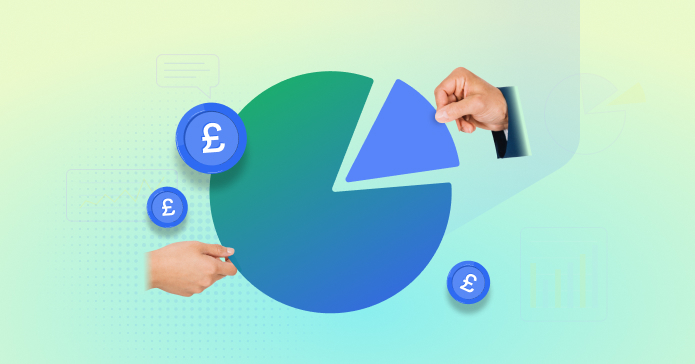A Simple Guide for Entrepreneurs
Business equity might sound like a complex financial term, but it’s more straightforward than you might think. Whether you’re an entrepreneur building your first startup, a small business owner navigating financial planning, or an investor evaluating new opportunities, understanding equity is essential.
This guide will explain;
- What does equity mean,
- Equity meaning in business,
- and how it impacts ownership and finances.
We'll break it down step by step, so even if you’re not a finance expert, you’ll walk away with a clear understanding.
What does Equity Mean in Simple Terms?
Equity, in its simplest form, is what you own minus what you owe. Imagine you own a house worth £500,000 but still owe £200,000 on the mortgage. Your equity in the house is £300,000.
For businesses, the same principle applies. Equity is the value left over after subtracting all the liabilities (debts) from the assets (what the business owns).
Think of equity as the net worth of a business. It’s the portion of the company's value that the owners or shareholders truly own after settling debts and obligations.
Equity Meaning in Business
From a business perspective, equity represents the ownership stake in the company. It’s the foundation of your business’s financial health and operational value. There are two primary components of equity in business:
- Assets – These are valuable resources a business owns, including real estate, cash, equipment, intellectual property, and even accounts receivable (money owed to the business).
- Liabilities – These are the financial obligations or debts, such as loans, taxes, supplier payments, or employee wages.
The equation looks like this:
Equity = Assets – Liabilities
For example, if your business owns £1,000,000 in assets (an office building, equipment, and cash) and has £400,000 in liabilities (loans and unpaid bills), your business equity is:
£1,000,000 - £400,000 = £600,000
Your equity indicates how much value belongs to you (or your shareholders) outright, beyond the debts you owe.
What Does Equity Mean to a Person?
For an individual involved with a business—either as an owner, shareholder, or investor—equity has a personal meaning rooted in ownership and financial stake.
- For entrepreneurs, equity means owning a piece (or all) of the company. It represents their hard work, risk, and investment in building a business.
- For investors, equity is their share of a company in exchange for providing funding. Equity often comes with perks like voting rights in company decisions and, in successful ventures, financial returns.
- Employees may also receive equity in the form of stock options, particularly in startups. This form of compensation gives employees partial ownership of the company, aligning incentives to ensure success.
Ultimately, equity is about ownership value. It is your share in the success (or risk) of the business.
What Does Releasing Equity Mean?
Releasing equity typically involves using the value of your equity to access cash. For example, you might refinance a business loan or sell a percentage of company shares to investors in exchange for funds.
For businesses, releasing equity is often a way to fuel growth. Instead of borrowing money (and accumulating debt), firms can offer equity to investors, enabling them to share both the profits and risks of the business.
Example of Equity in Business
Consider a bakery business:
- Assets include £50,000 in equipment (ovens, mixers, counters), £20,000 in cash, and £10,000 in accounts receivable, adding up to £80,000 in assets.
- Liabilities (debts) include a £30,000 business loan and £5,000 in unpaid bills, adding up to £35,000 in liabilities.
Equity = Assets – Liabilities
£80,000 - £35,000 = £45,000 in equity
This means the owner’s financial stake in the bakery is £45,000. If the bakery grows and its assets increase while liabilities stay low, its equity will also grow—making it more valuable.
Is Business Equity Good or Bad?
Equity, in most cases, is a positive indicator of financial health. High equity suggests a strong and stable business. Here’s why it’s beneficial for entrepreneurs, small business owners, and investors:
- Shows Financial Stability: Businesses with strong equity have more assets than debts. This signals financial health to stakeholders and potential investors.
- Attracts Investments: Future investors often evaluate equity to determine if a company is a worthwhile opportunity. If your equity is strong, you’re in a better position to raise funds.
- Ownership Retention: Boosting equity by growing assets while managing liabilities allows business owners to retain more control over their company instead of relying on external financing.
- Performance Metric: Monitoring equity gives business owners a clear picture of how effectively they’re managing and growing the enterprise.
However, equity isn’t everything. For businesses heavy on liabilities—like startups using debt to scale—low equity might not immediately mean failure. Instead, companies must focus on balancing equity and liabilities over time.
Things Beyond the Balance Sheet
It’s important to note that equity doesn’t capture every element of what makes a business valuable. For example:
- Growth Potential – Businesses with untapped markets or high scalability may have limited current equity but massive future potential.
- Customer Loyalty – A loyal customer base often amplifies business value, even if it doesn’t show directly on the balance sheet.
- Brand Strength – Equity doesn’t highlight brand reputation, which can be instrumental in driving long-term revenue.
These intangible factors often compliment the balance sheet, providing a fuller picture of the business’s value and growth trajectory.
Final Thoughts
Equity is more than a financial buzzword—it’s a crucial concept that every business owner, investor, and entrepreneur should understand. From measuring a company’s stability to facilitating smart investments, the equity meaning in business shapes how we assess value and growth potential.
If you’re ready to apply these insights, start by evaluating your own business equity. Ask yourself:
- Are assets exceeding liabilities?
- How can I grow my equity sustainably?
- What’s my plan for using equity to attract funding or grow the business?
Whether you’re running a bakery or launching a tech startup, these questions will guide your steps toward financial health and long-term success.
If you'd like help calculating or increasing your equity, or you're simply curious about next steps, check out more resources on our platform.













